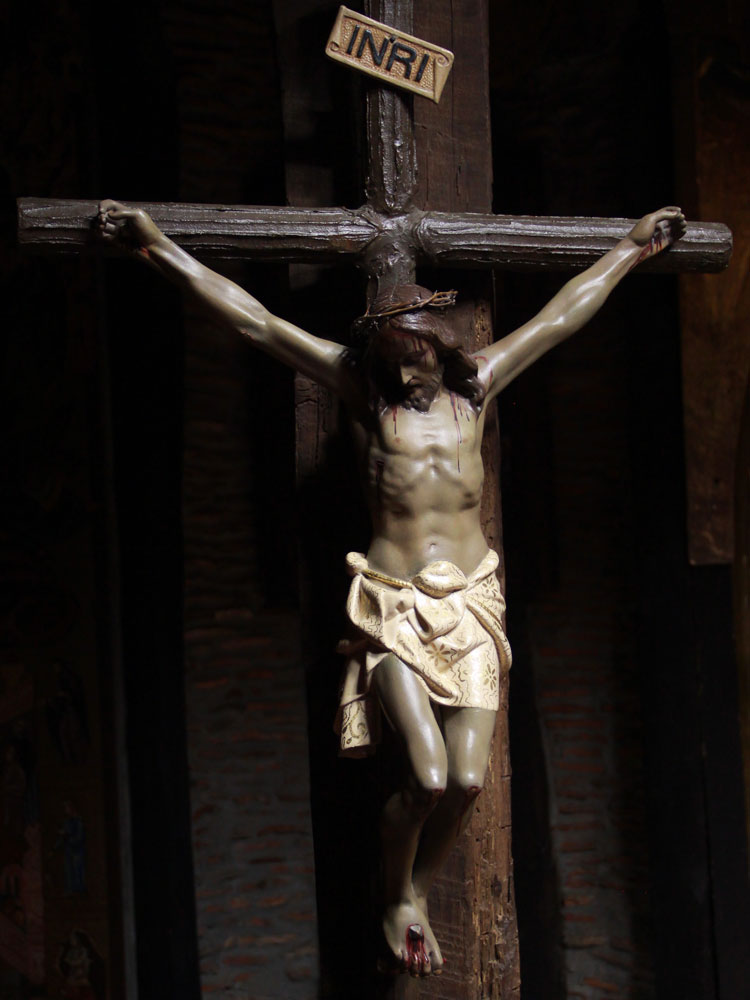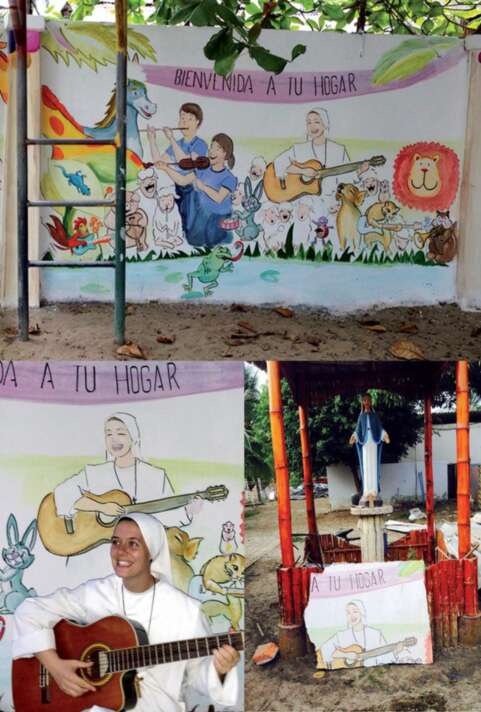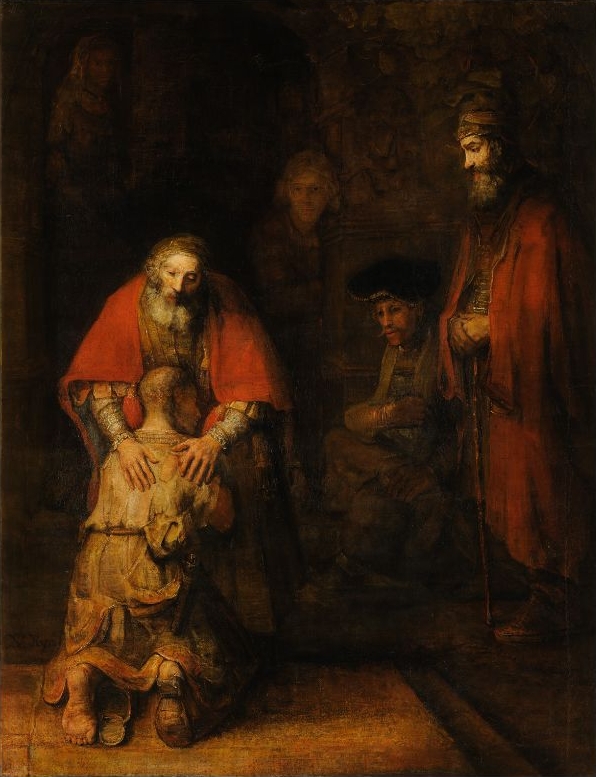Spy Wednesday and Sister Clare Crockett, Sub-Shepherdess
Ash Wednesday
At the solemn head of the great fast of Lent, gathered together for the Conventual Mass and ashes strewn upon our heads, the monks heard for the first time this year the great Lenten Tract Domine Non Secundum Peccata Nostra.
| Tractus Ps 102:10 Dómine, non secúndum peccáta nostra, quæ fécimus nos: neque secúndum iniquitátes nostras retríbuas nobis Ps 78:8-9 Dómine, ne memíneris iniquitátum nostrárum antiquárum: cito antícipent nos misericórdiæ tuæ, quia páuperes facti sumus nimis. Hic genuflectitur ℣. Adiuva nos, Deus, salutáris noster: et propter glóriam nóminis tui, Dómine, líbera nos: et propítius esto peccátis nostris, propter nomen tuum. |
Ps 102:10 O Lord, requite us not according to our sins which we have done, nor according to our iniquities requite us. Ps 78:8-9 O Lord, remember not our iniquities of old. Let Thy mercies go swiftly to meet us, for we are made greatly poor. Here genuflect ℣. Help us, O God, our Saviour, and for the glory of Thy Name, O Lord, deliver us, and deal kindly with our sins because of Thy Name. |
A Refrain throughout Lent
We have picked up this soulful and heartfelt plaint for six weeks, returning to our heart’s confident cry for mercy and divine aid each Monday, Wednesday, and Friday. It has become part of our regular liturgical heartbeat and descended into our own hearts. Remember not our iniquities of old. Help us, for the glory of Thy Name.
And Yet Not on Spy Wednesday
And so it is that we may have expected to have heard this same cry today. Let Thy mercies go swiftly to meet us.
And, indeed, it seemed as if we were to hear again this Lenten refrain, for we began to hear the notes of the familiar melody. But this time the words were different. Still a cry, yet a different cry flooded over us. Turn not away Thy face from me: in the day when I am in trouble, incline Thy ear to me…my days are vanished like smoke…I am smitten as grass, and my heart is withered. Have, then, our cries for mercy been in vain? Here, 42 days later, have we not yet been heard? Had our fasting, our longings, our cries, our tears all been in vain? Standing between the the porch and the altar, we have wept (cf Joel 2:17). We have forgotten to eat our bread, as the chant in today’s Mass states.
And has any of this had any value, or has it been like the wheel that spins to no purpose, like the grass that is pressed over by the wind only to straighten again (cf Psalm 82:14)?
Tu Exsurgens, Domine, Misereberis Sion
The very next verse gives the answer. In place of the prayer Help us, O God, our Saviour, the confident, almost triumphal answer is given:
Thou, arising, O Lord, shalt show mercy to Sion, because the time for showing mercy has come.
“It Is Time for the Lord to Act”

Just before the Divine Liturgy of St John Chrysostom — the Eastern Catholic rite of the Mass — is to begin, after the prayer to the Holy Spirit O Heavenly King, the Deacon addresses the priest in the words of Psalm 118:126, “It is time for the Lord to act.”
These words, “Thou, arising, O Lord, shalt show mercy to Sion, because the time for showing mercy has come”, have something of the same force as what the Deacon says, and in somewhat the same way. Having prayed for the Lord to come and help us for six weeks, at last the time of the Sacrifice has come. It is not now we who will be acting. It is the Lord. The time for showing mercy has come. It is time for the Lord to act. He is about to “sacrifice” Himself, not in a bloody way, as once and for all He did on Calvary, but by the renewal of these mysteries.
If any have delayed until the ninth hour, let him draw near, fearing nothing. If any have tarried even until the eleventh hour, let him, also, be not alarmed at his tardiness; for the Lord, who is jealous of His honour, will accept the last even as the first; He gives rest unto him who comes at the eleventh hour, even as unto him who has wrought from the first hour.
These words of St John Chrysostom are read in Eastern Churches and various places in the West (such as in our monastery) on the Pasch, that is, Easter Sunday. They convey the truth of what we are about to do. Have we prepared ourselves well? Then the Lord will use that preparation. Are we coming to these mysteries unprepared? Even so, is is time for the Lord to act. Now is the time for showing mercy.
Mercy
The Hebrew concept of mercy, hesed, contains not only kindness, especially for the downtrodden, but it also contains the idea of faithfulness. Mercy in the Bible is the fidelity a father has towards his son, the fidelity a wife has towards her husband. It is the one who keeps his covenantal promise. Jesus went to the Cross out of mercy, “the mercy which He promised to our Father, Abraham.” He is the Father Who keeps His promises. He did so for the Israel of faith, His firstborn son (Ex 4:22), for the Church, His Bride (Eph 5). He did this to work the restoration of that nature, so wounded and fallen, that had been stripped of its dignity. It was a great work of mercy, and the Church, reborn, came forth from His opened side in the form of blood and water, for she would be born and grow until the end of the age through Baptism and through the Eucharist.
He Keeps His Promises
How consoling is the promise of our Lord! He promised to build His Church on Peter and his successors, the Popes, and He promised this Church would last till the end of time.
He prayed for Peter, and thus gained a perpetual faith for Peter and his successors, the charism of infallibility.
He built His Church as a visible communion, promising a faith that would never fail, a union of sacraments that would never cease, a continuation of governance in his vicars, the Pope and the Bishops, that would last until He returned.
He promised a visible Church, one, holy, Catholic, apostolic, and (since the death of Peter), Roman, the only Church, outside of which none is saved; and He promised to abide with her till the end of time.
The script is already written. The victory already won.
To Apply the Merits of His Passion
If, then, the victory is already won, if Jesus has already died once and for all, if He has already entered victoriously into the heavenly sanctuary beyond the veil, what does it mean to go through His Mysteries again? Why does the Church set aside these three days? What does it mean to say that the time for showing mercy has come and it is time for the Lord to act?
It is because, while the Lord merited all things when He died the bloody death on the altar of the cross, the fruits of His Passion must be applied. What was gained in the Head of the Mystical Body of Christ must reach all the members of His Body, the Church, at every time, in every age and every place. The Church, immaculate and without spot or blemish, endowed perpetually with the holiness of Her Divine Bridegroom, is on this earth as a pilgrim, in a state of already and not yet. She possesses the holiness of Jesus that coexists with the sinfulness of her members. Jesus went through all so that each member of the Church could be united to Him entirely, but the story of that union is ongoing. During these three days, we wash away the negligences of other times, we are united to the work of Jesus, it is applied to us. Is this not what St Benedict says of the season of Lent in general?
A monk’s life ought to maintain a Lenten observance at every time, still, since this strength belongs to few, we would therefore urge them to guard their life in these days of Lent with all purity, and likewise to wash away in these holy days all the negligences of other times. This then is worthily done if we keep ourselves from all vices, if we apply ourselves to prayer with tears, reading, and compunction of heart, as well as abstinence. (Ch 49)
Does this not especially apply to these three days?
Especially for the Priesthood
God is at work these days. Jesus Himself applies the fruits of His Passion to wounds of His Church, the wounds especially that her members have contracted in the past year.
If this applies to all Catholics, it especially applies to the bishops of priests of the Catholic Church. How could this not be, since these days will witness the feast of the institution of the Mass on Holy Thursday, and since the very same sacrifice we commemorate on Good Friday is the sacrifice that the priests of the Church offer each day in an unbloody manner. St Thomas Aquinas, reflecting on the Lamentations which are read during Tenebrae, applied them especially to prelates of the Church. For him, the Church perpetually groans because of the sins of the priesthood.
We mentioned a little above that the promises of the Lord for the Church are sure. His gifts are irrevocable. And yet there is that situation of the “already” and the “not yet”. The promises are sure, the victory assured, but the struggle now is what is going to gain it. For this reason we must pray especially for the priests, the bishops, and the Pope during these three days when the Lord will act.
The Birthday of the Pope
If the priesthood continually needs the application of Passion of Christ such that we should pray especially for the priests, how much more true this is of the Bishop of the whole Church, the Pope. Popes change, one succeeding another, but the fact of their need for prayers never changes. We must always ask the Lord: Let Thy hand by upon the man of Thy right hand…then we will never turn back from Thee (Ps 79(80):18).
Spy Wednesday this year coincides with the earthly birthday of Pope Benedict XVI. Were he still alive, he would be 98 years old today. Holy Saturday marks the 20th anniversary of his election. Although it has been twelve years since he reigned as Pope, the monastery of Our Lady of the Cenacle has a special debt of gratitude to him, since it was in the grace of his pontificate that our charism was discovered.
The Election of a Pope

Today also marks the heavenly birthday of the Servant of God, Sister Clare Crockett. It was nine years ago today that the earthquake took her life, alone with five young candidates of the Home of the Mother, Valeria, Maria Augusta, Jazmina, Mayra, and Catalina.
Eleven years before that day in 2016, back on 19 April, 2005, Sister Clare Crockett had seen Benedict XVI, the newly elected Pope, come out on the balcony. It was only some short years previously that she had turned away from the pursuit of Hollywood fame and from partying, drinking, and (a thing particularly difficult for her to break) from smoking, after an encounter with the sacrificial love of Jesus. Now she stood in St. Peter’s Square, a novice with a little less than four months to go before her first vows.
In the time leading up to the Conclave, Sister Clare had been praying — even expecting — that Joseph Cardinal Ratzinger would be elected Pope. As she stood in Saint Peter’s Square, even before the name was said, she had been shouting “RATZINGER!!”.
The next day, she heard a rumor that the newly elected Pope was walking across St. Peter’s square.
![]() The rumor that the Pope was there turned out to be true. Pope Benedict XVI had walked to his old apartments to get some of his things. Thanks to her prompt credulity and speed, she was able to see him up close. The experience of being so close to a Pope she already loved must have touched her deeply. Perhaps this is part of why she pored over his first homily in the weeks to come, internalising it, meditating it, ruminating it:
The rumor that the Pope was there turned out to be true. Pope Benedict XVI had walked to his old apartments to get some of his things. Thanks to her prompt credulity and speed, she was able to see him up close. The experience of being so close to a Pope she already loved must have touched her deeply. Perhaps this is part of why she pored over his first homily in the weeks to come, internalising it, meditating it, ruminating it:
In this way, we serve not only him, but the salvation of the whole world, of all history. The symbolism of the Pallium [which the Pope received] is even more concrete: the lamb’s wool is meant to represent the lost, sick or weak sheep which the shepherd places on his shoulders and carries to the waters of life. For the Fathers of the Church, the parable of the lost sheep, which the shepherd seeks in the desert, was an image of the mystery of Christ and the Church. The human race – every one of us – is the sheep lost in the desert which no longer knows the way. The Son of God will not let this happen; he cannot abandon humanity in so wretched a condition. He leaps to his feet and abandons the glory of heaven, in order to go in search of the sheep and pursue it, all the way to the Cross. He takes it upon his shoulders and carries our humanity; he carries us all – he is the good shepherd who lays down his life for the sheep. What the Pallium indicates first and foremost is that we are all carried by Christ. But at the same time it invites us to carry one another. Hence the Pallium becomes a symbol of the shepherd’s mission…
These words of Pope Benedict XVI were spoken in the homily of his inaugural Mass, 24 April, 2005. Liturgically, April 24, 2005 was the Sunday of the Good Shepherd (according to the new calendar).
Sub-shepherdess
On 3 May, 2005, Sr Clare explained in her own words the impact that this homily had.
In the days prior to the Spiritual Exercises, I’ve been using Pope Benedict’s homily where he talks about his new role as Successor of Peter. For me, this man is a great example and he makes me want to seek and love truth more deeply. So, reading the homily I’ve received many insights that continue helping me during these Exercises.
The Lord has made me understand that I exist in order to show God to man—with my example, with my life, with the intensity of my surrender and not just with words. I feel a powerful and distinct call to participate somehow in the Pope’s mission. I have to be a sub-shepherd that carries the lost sheep (mankind, especially children and young people) on my shoulders and lead them to life-giving waters: present God to mankind. I also feel the call to be a fisher of men, and with the net of the Gospel and the example of my life, rescue souls from the waters of death, so they can have the life that is true life: present God to mankind. ‘Being an example for the flock’ (1 Peter 5). Can I reveal God to mankind by picking weeds in a corner of the garden? The [Holy] Spirit tells me yes, if I do so united to Jesus and offering this work with the help of the Holy Spirit, for the salvation of mankind and the unity of the Church, to the Father. Even if I don’t realize it, God will show Himself to mankind through that work. I’m showing God to mankind without seeing them.
While the Lord allows me to understand these things, there are other things that He makes me feel and write, even though I do not fully understand. I have a great desire to be one with the Lord, to let Him live in me, and He also wants it… Not being His reflection makes me suffer, along with my great lack of humility and love. It seems like the more I know Him, the more I experience how poor my love is.
April 16, 2016
Let us return to the day of the earthquake, eleven years later, minus 8 days, Pope Benedict XVI’s 89th birthday. After turning from Mass for Good Shepherd Sunday, at 6:58 PM (11:58 PM in Ireland) the sub-shepherdess went to meet the Lord. A mural, painted by Marta, a young Spanish architect on a mission trip, testifies to Sister Clare’s continued role as sub-shepherdess from heaven. When Sister Estela suggested to Marta that she pains a mural as part of her mission trip:
Marta…did not hide her contentment. She loved painting and was glad to brighten up the school with her talent. “Sure, Sister! But what do you want me to paint?”
Sr. Estela thought for a moment. “I’m not sure. What do you think?”
“Why not the parable of the lost sheep?” Marta proposed.
“Good idea!” Sr. Estela responded.
Marta got to work as soon as possible. The children were excited to see Marta’s first sketches on the wall during recess.
“What are you going to paint, Marta?”
“The parable of the lost sheep, like the song Sr. Clare sings with you.”
“Ah, but where’s Sr. Clare?”
One after the other, the children who saw Marta painting requested that Sr. Clare be included in the party the shepherd throws at the end of the mural. It represented the joy of Heaven and the overabundant love of the Shepherd for the lamb He had rescued. How could the children imagine a celebration in Heaven without Sr. Clare playing the guitar?
Most of the wall surrounding the playground fell during the earthquake, but one section was untouched: Sr. Clare singing with all her heart and playing the guitar, with the words, “Welcome home!” written above her, as she celebrated the arrival of the lost sheep into Heaven. Sr. Clare and the five girls who were with her passed away precisely on the eve of the Sunday of the Good Shepherd. The Lord did not want us to forget that He knows His sheep and gives them eternal life.
It Is Time for the Lord to Act
In the weeks leading up to the Earthquake, Sister Clare had been like one led at every step by Divine Providence, as if the Lord were acting. She and her companions were prepared marvelously for their time to meet the Lord.
As we enter into this time of showing mercy, when the Good Shepherd lays down His life for His sheep, Sister Clare can be a powerful intercessor for us and for the Church she loved so dearly. Now from heaven she can accompany us, as once she accompanied the Lord. Her own words of her experience of union with the Lord’s passion can be a help for us in the days ahead. She writes:
Finding myself there in Gethsemane with the Lord, I asked Him to let me feel what He was feeling. I asked it with tears and wholeheartedly, knowing that if I placed my entire being in supplication, with great intensity, that the Holy Spirit could not deny me His intervention with great strength. And that’s what occurred. The Lord allowed me to see and feel what He was seeing and feeling in that moment. I saw the disgust for sin, how it is so horrible that it makes even Christ weep, lying prostrate, trembling. I saw Black Masses, people breaking the Eucharist, someone sitting on a crucifix, people shouting ‘I hate you’ to God, abandoned children, aborted babies in dumpsters, Cardinals without faith, Cardinals who want to destroy the Church, priests receiving the Lord in mortal sin, priests without faith, priests with women, with nuns, nuns who didn’t obey, young people with perverse images of the Lord and Our Lady on their shirts, young people drugging themselves in nightclubs, people who were drunk, broken marriages, domestic violence, superficiality, abandoned tabernacles, faithful receiving the Lord in mortal sin, out of routine, elderly people who have been abandoned, elderly being violently abused, elderly dying in solitude and forsaken, humble people being treated unjustly by the powerful, simple folk being humiliated by the powerful, priests, religious, faithful being tortured on account of their faith, the death of several priests at the hands of their enemies, robberies, adulteries, and I also saw some of my sins.
For all of this, it is time for the Lord to act, for now truly is the time for showing mercy.
Sister Clare finishes her thoughts:
I felt like I had to get closer to the Lord. All I could offer was so little. My love is nothing compared to His. I had to console Him with the little I had or have. The enemy was on the other side of Him. He looked at me and said he was going to destroy me. The Lord was prostrate. With His right hand He was grabbing soil and He had His left hand outstretched with the palm of His hand turned upwards, as if He were offering Himself to the Father. I placed my hand in that hand and the Lord squeezed mine tightly. He was shaking. I suffered there with Him and begged forgiveness. I promised to never abandon Him and I asked Him to never abandon me.

